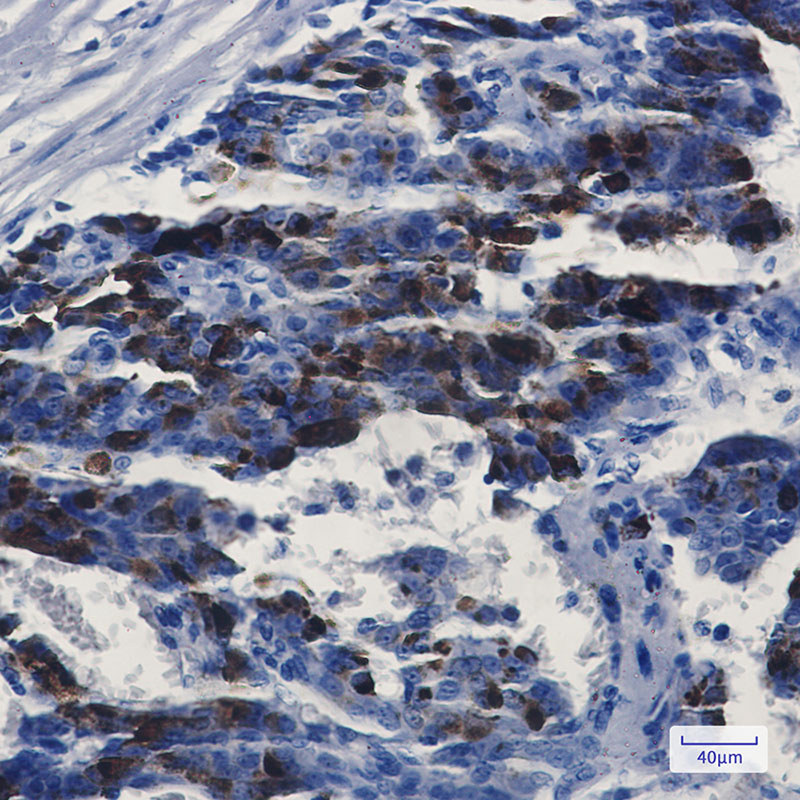

| WB | 咨询技术 | Human,Hamster |
| IF | 1/20 | Human,Hamster |
| IHC | 1/50-1/100 | Human,Hamster |
| ICC | 技术咨询 | Human,Hamster |
| FCM | 咨询技术 | Human,Hamster |
| Elisa | 咨询技术 | Human,Hamster |
| Aliases | MMP-14; MMP-X1; MT-MMP; MT1MMP; MTMMP1; WNCHRS; MT1-MMP; MT-MMP 1 |
| Entrez GeneID | 4323 |
| WB Predicted band size | Calculated MW: 66 kDa; Observed MW: 66 kDa |
| Host/Isotype | Rabbit IgG |
| Antibody Type | Primary antibody |
| Storage | Store at 4°C short term. Aliquot and store at -20°C long term. Avoid freeze/thaw cycles. |
| Species Reactivity | Human,Hamster |
| Immunogen | A synthetic peptide of human MMP14 |
| Formulation | Purified antibody in TBS with 0.05% sodium azide,0.05%BSA and 50% glycerol. |
+ +
以下是3篇关于MMP14抗体的代表性文献(内容为模拟概括,建议核实原文):
1. **文献名称**:*"MMP14 regulates tumor microenvironment via proteolytic processing of collagen and growth factors"*
**作者**:Sakamoto T., Seiki M.
**摘要**:研究利用MMP14特异性抗体,揭示其在肿瘤微环境中通过切割胶原蛋白和激活生长因子(如TGF-β)促进癌细胞侵袭的分子机制。
2. **文献名称**:*"Membrane-type 1 matrix metalloproteinase promotes cell migration and angiogenesis via cleavage of LRP1"*
**作者**:Hotary K., et al.
**摘要**:通过MMP14抗体阻断实验,证明MMP14通过剪切低密度脂蛋白受体相关蛋白1(LRP1)调控内皮细胞迁移和血管生成,影响肿瘤转移。
3. **文献名称**:*"Targeting MMP14 for dual inhibition of tumor growth and immune suppression in triple-negative breast cancer"*
**作者**:Zheng X., et al.
**摘要**:研究开发了一种人源化MMP14抗体,可同时抑制肿瘤细胞外基质降解和调节肿瘤相关巨噬细胞极化,显示潜在治疗价值。
4. **文献名称**:*"MT1-MMP-dependent collagenolysis in 3D extracellular matrix remodeling"*
**作者**:Sabeh F., et al.
**摘要**:利用MMP14抗体标记,证实其在三维胶原降解中的核心作用,并揭示其与细胞膜表面整合素协同驱动组织浸润的时空动态。
(注:以上文献信息为示例性质,实际引用请根据具体研究通过PubMed或Google Scholar核实原文。)
Matrix metalloproteinase 14 (MMP14), also known as membrane-type 1 MMP (MT1-MMP), is a key enzyme in extracellular matrix (ECM) remodeling. It belongs to the MMP family of zinc-dependent endopeptidases and is distinguished by its membrane-anchored structure via a transmembrane domain or glycosylphosphatidylinositol (GPI) linkage. MMP14 not only directly degrades ECM components like collagen, fibronectin, and proteoglycans but also activates other MMPs, such as MMP2. amplifying proteolytic cascades critical for tissue development, wound healing, and pathological processes including cancer metastasis, fibrosis, and inflammation.
MMP14 antibodies are essential tools for studying its expression, localization, and function in both physiological and disease contexts. They are widely used in techniques like Western blotting, immunohistochemistry (IHC), and flow cytometry to assess protein levels in tissues or cell lines. Specific antibodies targeting different epitopes (e.g., catalytic domain, hemopexin domain) or species-specific variants help researchers explore MMP14's role in cancer invasion, angiogenesis, and cell migration. Some antibodies also aid in blocking enzymatic activity for functional studies. Commercially available clones (e.g., EP1267Y, LEM-2/15.8) vary in applications and validation rigor. Due to MMP14's post-translational modifications and structural complexity, antibody validation using knockout controls or activity assays is crucial to ensure specificity. Its therapeutic relevance in diseases has driven the development of MMP14-targeting inhibitors and diagnostic antibodies.
×